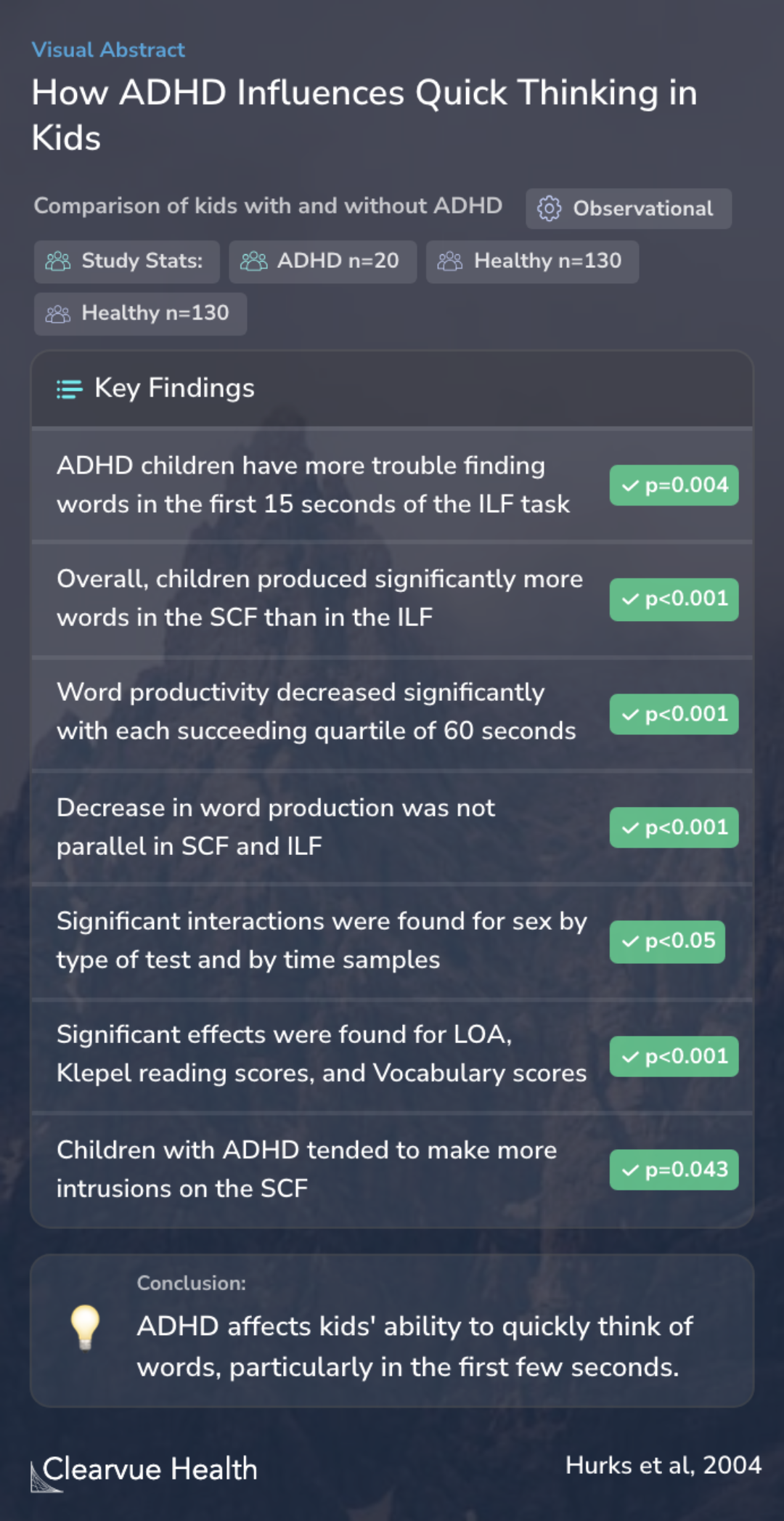Verbal fluency over time as a measure of automatic and controlled processing in children with ADHD
How ADHD Influences Quick Thinking in Kids
Hurks PP, Hendriksen JG, Vles JS, Kalff AC, Feron FJ, Kroes M, van Zeben TM, Steyaert J, Jolles J

Objectives
The study investigated how children with ADHD perform on two different types of word-thinking tasks: one where they think of words in a category (like 'animals') and another where words start with a specific letter. The idea was to see if kids with ADHD have a tougher time with the letter task, which isn't as straightforward for them.
The performance of ADHD children on semantic category fluency (SCF) versus initial letter fluency (ILF) tasks was examined. For each participant, word production was recorded for each 15-s time slice on each task. Performance on both fluency tasks was compared to test the hypothesis that...
Methods
In this investigation, the team looked closely at how each child came up with words over time. They compared the number of words kids could think of in two kinds of tasks. One was about naming things in a category, and the other was about thinking of words that start with a certain letter. This study wasn't just a simple count; it looked at how these kids did over several moments.
For each participant, word production was recorded for each 15-s time slice on each task. Performance on both fluency tasks was compared.
Results
The findings showed something interesting: all kids, not just those with ADHD, slowed down in coming up with words as time went on. It seems like everyone starts with the easiest words and then hits a bit of a wall. But the study did find that, right at the start, kids with ADHD struggled more with the letter task. This suggests that this task is harder for them, perhaps because it's not something they do automatically.
Results indicated that the groups could not be differentiated by the total number of words produced in 60 s in either fluency task. As hypothesized, a significant interaction of group by productivity over time by type of fluency task was found: ADHD children had more problems finding wor...
Conclusions
This research hints that ADHD might make it tougher for kids to quickly think of words, especially when they need to follow specific rules like starting with a certain letter. It's as if their brains need a bit more time to get going on these tasks. This study adds to the bigger picture, showing how ADHD can make certain thinking tasks more challenging.
Results were taken to indicate that children with ADHD symptoms show a delay in the development of automating skills for processing abstract verbal information.
Key Takeaways
Context
Research in the field of child development has long been intrigued by the relationship between language difficulties and ADHD (Attention Deficit Hyperactivity Disorder) symptoms in children. An insightful study by Hawkins et al., 2016, delved into how attention and hyperactivity issues are connected to language problems in kids. The researchers discovered that children with attention difficulties often faced challenges with practical language use, such as understanding and using language in daily interactions, albeit they encountered fewer problems with literacy skills, like reading and writing. This finding is pivotal as it highlights that behavioral issues might be more closely related to everyday language skills rather than academic language abilities.
Further expanding on this area, Kim et al., 2000, conducted a comparative study on language skills between children with ADHD and those without. The results indicated that while kids with ADHD had a vocabulary range comparable to their peers, they lagged behind in grammar and conversational skills. This suggests that ADHD could specifically impair certain facets of language abilities in children, affecting how they construct sentences and engage in dialogues. Such insights are crucial for educators and parents to understand the nuanced ways in which ADHD might impact a child's communication capabilities, beyond the more noticeable hyperactivity and attention challenges.